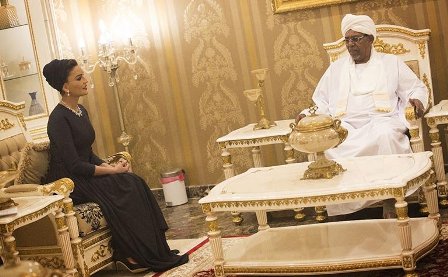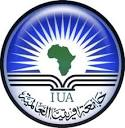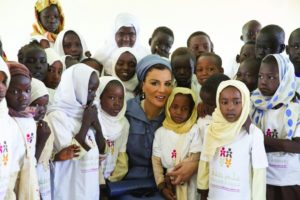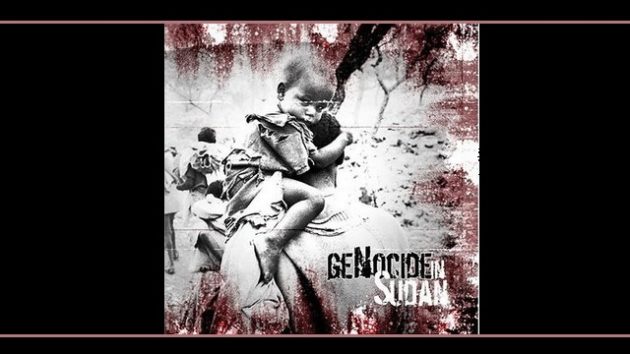Why Is Political Islam in Sudan supported by Gulf Emirates and Saudi Arabia?
by Lieutenant General Abakar M. Abdallah

Her Highness Sheikha Mozah Bint Nasser of Qatar with Sudan President Omar Bashir Khartoum, March 12, 2017.
The Political Islam system in the Sudan spearheaded by the National Congress Party regime is supported by the State of Qatar. The relationship is contributing to growing Islamic extremist groups and international terrorism in the world. Some Salafi movement leaders in Khartoum openly support ISIS; some Sudanese college students are already fighting for Jihad in Libya and Syria. Sudan’s geographical location and the ruling elite’s historical ties with Middle East nations have been the main reasons allowing the Khartoum regime to support global extremism in both ideology and fighting for Jihad without been stopped.
Those countries fighting in the global war against terrorism failed to understand how Sudan’s Muslim Brotherhood/National Congress Party (NCP) regime functions. The regime is telling the international community one thing and doing something else. For instance, the four Sudanese who killed John Granville, the American who was working in the USAID in Khartoum and his Sudanese driver Abdelrhaman Abass in 2008 were convicted to life sentences. However, the Sudan regime declared that they escaped from prison. These men were convicted to deceive the American government that the Sudan regime was not behind the assassination. The regime convicted the men to mislead both the US government authorities and the victims’ families that justice had been done. In reality, the Sudan regime released the prisoners under the pretext that they escaped from prison and sent them to fight as part of al Qaeda in Somalia and later to join the Islamic State and fight for ISIS in Libya.
The rise of the Islamic movements in Sudan started in early 1930s. The Sudanese society is characterized by a geographic diversity reflected in its multi-cultural, multi-ethnic, multi-lingual and multi-religious populations. However, the Islamic movements ignored these facts and formed a government based its ideology on sectarian parties, tribalism, and religious extremism that excluded the majority of the Sudan’s population from their basic rights of citizenship. This exclusion has caused Sudan’s perpetual crisis that resulted in an endless civil war that subjugated the population of the country.
Throughout the history of Sudan, the successive regimes have been using the same vicious slogans: “Sudan is an Arab land, Defending Islam, Spreading Islam in Africa, Defending the Palestine Cause, and Defending Arabism.” Using these themes, successive regimes that ruled Sudan able to convince and at times mislead the Middle East nations to secure political, moral, material, and financial support.
It is in the context of this strategy that the NCP regime in Khartoum obtained financial support from Gulf States, because they ignored the majority non-Arab Sudanese people seeing the Sudan as an Arab country; constructing an Islamic Arab state and defending the Arab cause against Africanism, imperialism (America), and Zionism (State of Israel). Such belief is an important part of their political, religious, and social cohesion that generates funding to finance all forms of terrorism not only in the Sudan but also in the African Sahel region and the world. Those countries combating the global war on terrorism should understand these facts. They should deal with Bashir’s regime committing genocidal war crimes and crimes against humanity against the people of Darfur, Blue Nile and Kordofan.
The NCP regime’s ultimate goal is not to bring peace, stability, justice and the rule of law. Rather it is to spread radical Islamic ideology eventually establishing a Caliphate in the Sudan at the expense of destroying the entire people in the country’s conflict regions through the use of violence to intimidate its opponents. This regime has the habit of forming false alliances to resolve most crises. It also uses racial, ethnic, and tribalism to divide the people and deal with each group separately. The NCP government also uses religion as the word of God to frighten and control people. It uses deception, fomenting and financing of tribal conflicts, use of propaganda through its controlled media, forming alliances with under privileged groups. It uses state funds to bribe opponents to obtain their support consequently weakening them prior to their destruction. The NCP has not limited itself to the use of these tactics. It has also created Islamic institutions that functions within and outside its government to advance its Islamic extremist ideological vision in the world. These organizations include but not limited to:
- Leadership Bureau of the National Congress Party. This is where all the powers of the NCP reside. All higher decisions emanate from this office. For example, appointment of executive positions such as ministers, ambassadors, governors, senior military commanders.
- Islamic Movement (IM). The IM was created to serve as a political base for the NCP. IM unites domestic and international radical Islamist groups under its umbrella. It provides them with ideological guidance seeking to apply Islamic Sharia law to the entire world.
- Islamic Da’wa organization (IDO). The IDO is a Sudanese Islamic NGO founded in 1992 and designated to work in Africa. The organization is supported and funded by Saudi Arabia and other Arab Gulf States. IDO is a member of the International Islamic Council for Da’wa and Relief (IICDR). The IICDR is an umbrella of over 100 Islamic organizations most of them associated with Muslim Brotherhood, Al Qaeda, and Hamas. These organizations provide political guidance, ideology, recruitment, and funding for all Islamic Salafi movements in the world. IDO is headed by retired Field Marshal and former President of the Sudan Abderhaman Siwar al Dhahab. He is also the current Chairman of the Board of Trustees of the Union of Good (UOG) member organization. The UOG is designated by the US Department of the Treasury as a terrorist organization providing financial assistance to Hamas.
-

International University of Africa logo.
International University of Africa (IUA). The IUA is a public university located in Khartoum and like any other educational institution, has many faculties. However, it concentrates on two subjects: (1) Islamic Shariah and (2) Islamic studies. This institution is designed to train preachers and educate young African Muslims indoctrinating them with the Salafist view of Islam. The IUA University becomes an important Islamic center for Sub-Sahara Africa educating people in Islamic extremist ideology.
Through these organizations the Sudan government and Gulf States are engaged in spreading extremist Islamic ideology contributing to global extremism. If we look a few years back, we see al Qaeda was present only in small areas of Afghanistan and Pakistan. Today we see Jihads all over the world and they are developing rapidly. We are regularly receiving information that Sudan and Qatar are providing financial and military assistance to Islamic militants in Libya, Mali, and possibly to Boko Harm in Nigeria.
Despite US Government placing financial restrictions to Sudan, Saudi Arabian government regularly donates money to the Sudan regime. Saudi Arabia gave Sudan $1billion in July and August 2015. These funds were given in the form of loans or investments. Recently, the Sudanese authorities mentioned that they expect to receive $4 billion following Khartoum’s decision to join the Saudi-led military coalition against Houthi rebels in Yemen. The flow of money from Saudi Arabia to the Muslim Brotherhood regime in the Sudan contributes to financing Global Jihad.
The IM, IDO, IICDR, and UOG organizations collect funds not only from the oil rich Gulf States but from companies, businessmen, Princes, Sheiks, traders, and ordinary people. These people give donations not for the purpose of supporting terrorism but for the goal of either advancing Pan-Arabism or supporting Islam. Most of these people do not care about what the result of their donation bring; they just give for the purpose of advancing Islam or Arabism.
Sudan President Omar Bashir’s trip to South Africa in violation of the outstanding International Criminal Court warrant for his arrest was settled by the Emir of Dubai. He paid one hundred million dollars to the South African government within the week following the incident. The Emir travelled to South Africa and settled the deal. Why did the Emir pay this money? The Emir paid the money simply because he has business interest in Sudan and was defending Pan Arabism.
Her Highness Sheikha Mozah Bint Nasser, royal consort of Emir of Qatar Sheikh Hamad bin Khalifa Al Thani, visited Sudan on March 12, 2017. She was welcomed by the first lady of Sudan Widad Babiker. She met with President Bashir and discussed development projects for Sudan. The Sheikha also visited North Kordofan State to meet with the notorious Janjaweed leader Ahmed Harun who has been indicted by the International Criminal Court but is still at large. In order to draw away the international community attention Sheikha Mozah visited pyramids in Merowe, Sudan’s historic City in which Qatar and Sudan have joint Archeological projects.
The Sudan government obtains from the Arab League and the oil rich Gulf States through official and nonofficial channels. In 2007 and 2008, the Arab League gave the Sudan government over $500 million in the name of development in Darfur. Sheik Moza who visited Khartoum on March 12, 2017 donated $200 million dollars to Bashir to recruit and train more Janjaweed militias. These funds will be used to finance terrorists and recruit Janjaweed to kill the indigenous people of Darfur, Blue Nile and Kordofan. Even though the money comes in the name of development, they used to recruit, train, and arm Janjaweed militias to kill the people of Darfur. The wealthy oil rich Gulf Emirates, especially Qatar, provide Sudan funding in the name of development projects while secretly working to establish an all Arab Caliphate in Darfur and African Sahel region.
Following the visit of the Qatari State Minister in Darfur, he promised to fund 17 development projects in Darfur. Since the signing of the Darfur Doha agreement both Qatar and Sudan spoke of developments in Darfur. Last July Chairman Tijani Sisi of the Darfur Regional Authority mentioned that his organization realized 1800 projects in Darfur. It’s easy to say in words but the fact is that over 3 million people of Darfur are living in internally displaced persons and refugee’s camps. Where are the 1800 projects that Chairman Sisi is talking of that he and his group realized? Where is this large number of projects that could not be seen in Darfur? The truth is that there are no projects in Darfur other than recruiting and training of Janjaweed and terrorists to kill innocent people.

Sheikha Mozah with innocent school children of North Kordofan, March 13, 2017.
The fact is that the Sudan government recruited and trained 34,000 Arab Janjaweed militias funded by State of Qatar. These Arab tribal militias are currently prepared to secure new settlement projects (construction of villages and digging of water pumps for new Arab settlers) in North Darfur. As I am writing this report, they deployed over 100 armed Toyota Pickup trucks of Rapid Support Forces to provide security protection to dig these water pumps at Wadi Azerk in Wadi Hawar, North Darfur. Their plan is to create 1,200 new Janjaweed villages in the area north of Kutum adjacent to the borders of Libya. Villagers in Disah, North Darfur were told to abandon their villages and move to the IDP camps or to the cities because next year they will not be allowed to cultivate their land. They said that area north of Kutum to the border of Libya is designated for Arab Janjaweed animal husbandry.
Conclusions
The Sudan government is contributing to the growing global Islamic extremist ideology and Jihadism. Eliminating this regime is a necessary requirement for peace. Its removal from Khartoum would greatly reduce the phenomenon of Islamic terrorism in the world. This would eliminate the system of sectarian parties, tribalism, and religious discrimination that successive regimes use to divide and rule Sudanese society. Regime change in Khartoum would call for creation of a secular and Sudanese identity transcending tribal and religious boundaries emphasizing equality and justice for its entire people.
EDITORS NOTE: This column originally appeared in the New English Review.



Leave a Reply
Want to join the discussion?Feel free to contribute!